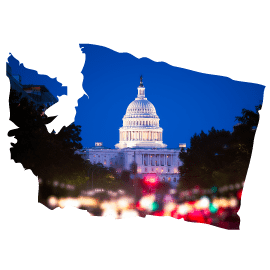Teacher Preparation Program Accountability :
Washington
Delivering Well Prepared Teachers Policy
Analysis of Washington's policies
Washington's approval process for its traditional and alternate route teacher preparation programs does not hold programs accountable for the quality of the teachers they produce.
Washington requires that preparation programs collect candidate "work samples" that document positive impact on student learning; however, the state has no requirement that value-added data will be utilized to connect student achievement gains to teacher preparation programs.
Washington collects some objective, meaningful data to measure the performance of its alternate route programs, including licensure test scores and first year teacher/principal surveys. However, the state does not apply any transparent, measurable criteria for conferring program approval and does not collect these data for its traditional teacher preparation programs.
Further, in the past three years, no programs in Washington have been identified as low performing—an additional indicator that programs lack accountability.
Finally, Washington's website does not include a report card that allows the public to review and compare program performance.
Recommendations for Washington
Collect data that connect student achievement gains to teacher preparation programs.
To ensure that programs are producing effective classroom teachers, Washington should consider academic achievement gains of students taught by the programs' graduates, averaged over the first three years of teaching.
Gather other meaningful data that reflect program performance.
In addition to knowing whether programs are producing effective teachers, other objective, meaningful data can also indicate whether programs are appropriately screening applicants and if they are delivering essential academic and professional knowledge. In addition to the data it collects on its alternate routes, Washington should gather data for all teacher prepraation programs such as the following: average raw scores of graduates on licensing tests, including basic skills, subject matter and professional knowledge tests; satisfaction ratings by school principals and teacher supervisors of programs' student teachers, using a standardized form to permit program comparison; evaluation results from the first and/or second year of teaching; and five-year retention rates of graduates in the teaching profession.
Establish the minimum standard of performance for each category of data.
Programs should be held accountable for meeting these standards, with articulated consequences for failing to do so, including loss of program approval after appropriate due process.
Publish an annual report card on the state's website.
To inform the public with meaningful, readily understandable indicators of how well programs are doing, Washington should present all the data it collects on individual teacher preparation programs.
State response to our analysis
Washington recognized the factual accuracy of this analysis. The state added that this is why it is one of five lead states in the Teacher Performance Assessment consortium. The research agenda will link this assessment with student achievement gains, which will serve as the key indicator of program quality. In addition, Washington noted that in the past year, the Professional Educator Standards Board developed data MOUs for all preparation programs, and the state is assembling a framework of evidence based on these data. Motivated by a desire to move away from a preparation program accountability system based on infrequent program site visits with a high degree of reliance on professional judgment, Washington asserted that its goal is a framework of evidence and a queryable data system that will incorporate ongoing and expanded metrics of preparation program quality that can inform program improvement and accountability on an ongoing basis.
Select another topic
Delivering Well Prepared Teachers
- Admission into Preparation Programs
- Elementary Teacher Preparation
- Elementary Teacher Preparation in Reading Instruction
- Elementary Teacher Preparation in Mathematics
- Middle School Teacher Preparation
- Secondary Teacher Preparation
- Secondary Teacher Preparation in Science
- Secondary Teacher Preparation in Social Studies
- Special Education Teacher Preparation
- Assessing Professional Knowledge
- Student Teaching
- Teacher Preparation Program Accountability
Expanding the Pool of Teachers
Identifying Effective Teachers
- State Data Systems
- Evaluation of Effectiveness
- Frequency of Evaluations
- Tenure
- Licensure Advancement
- Equitable Distribution
Retaining Effective Teachers
Exiting Ineffective Teachers
Research rationale
See NCTQ, Alternative Certification Isn't Alternative (2007) regarding the dearth of accountability data states require of alternate route programs.

